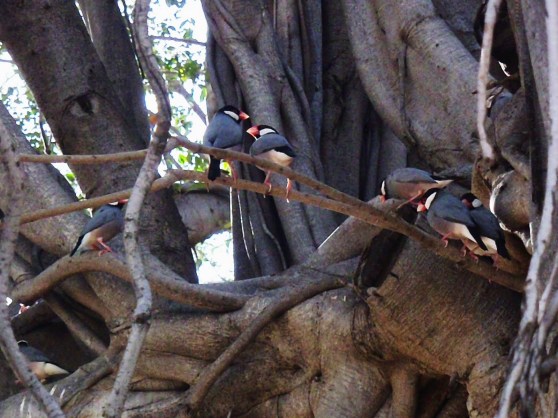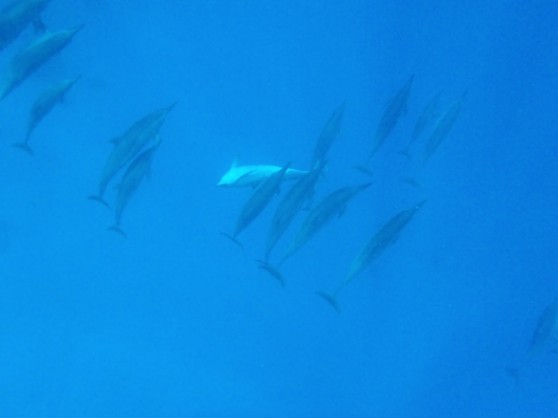
I had a really great day today. I am currently at the American Psychiatric Association meeting in Hawaii. I feel like a lot of my professional life has been a critique of the mainstream of psychiatry, whether it has been studying psychotherapy (which according to a lecture today has “always been subversive,” because it challenges people’s understanding of themselves, their relationships, and it challenges the status quo), learning about trauma and bearing witness, or moving outside the confines of psychiatry into holistic medicine. The thing about living a critique is that it can start to get lonely, because I seem to continually question the fitness of the different treatment/personal growth philosophical systems that I put myself in. It is kind of like the dilemma of trying to find a group of people who don’t fit in and who form a community of “misfits.” Looking around at the conference today, I felt that old desire to be part of the group while also finding fault in the limitations of the dominant, evidence-based paradigm. I was slightly envious of the people who seemed to have built something in their lives over time as I compared myself to them. The thing with continually being open to new ideas and practices is that there is a risk of ending up intellectually homeless and unrecognized, another way of saying that I felt outside of the circle. With my recent move to New Zealand, I have faced this dilemma of wanting to fit in, but also wanting to follow my own passion and my own ethics and idealism.

Yesterday, I had this realization. I won’t bother putting it into words, it would sound incredibly simplistic, anyway, but it was just this felt sense of connection and meaning, even if I wasn’t feeling a clear sense of purpose. That is when I thought about blogging on the topic of coming full circle, which can mean so many things at so many different levels. On this trip, I brought along Maugham’s, The Razor’s Edge, a book I read a lot when I was in college and medical school. In some ways, the book is important and in some ways it is not, what is more important is re-connecting to things that I was interested in the past, and more important than intellectual things I was interested in, it was about connecting to the feeling of who I was when I was younger and what was important to me, including questioning, searching, and idealism. I had this sense of meeting an old friend, only the old friend was my younger self.
Part of what I was going to write about was a critique (or maybe just another chapter) of my article for PrivatePractice.MD, “Say Yes to Private Practice,” that I wrote as I was leaving private practice. I referenced the movie, “Yes Man,” which I just re-watched again when it was on TV. In the movie, Jim Carey’s character turns his life around by saying “yes” to every opportunity that came along. His life opened up and changed and became more rewarding when he said “yes,” and it closed down, became painful, or problematic when he refused to say “yes” to a new opportunity. In the movie, he hits a peak, though, in how useful this way of living is, everything starts to fall apart as he realizes that he can’t build a relationship if he is constantly saying yes to other things. He comes to learn a more sophisticated way of using this attitude, he learns to say yes only to things that he really, in his heart, wants to do. It isn’t about saying yes to everything, although that was a useful stage that helped him get unstuck in his life, but he learns discernment in choosing to say yes to what he is really passionate about. So that is where I have been feeling like I am lately, that I am at that point where I need to be more discriminating in what I say “yes” to, particularly after my first job in New Zealand where I feel like I burned out after about 2 months in the job and I took on a lot of challenges that were bigger than my own interests.
So, that is what I was going to write about, how I had so much growth in my life through saying “yes,” but that it was time to start reining all that in a bit and to start being more discerning in what I put my energy into and making sure that I am not just doing what needs doing, or jumping into an opportunity, but really practicing discernment and making sure my heart was in whatever I take on in the future. That said, today I had two really cool synchronicities that happened only because I said a few chance words. It was like the old accidental networking (which is what I used to call it) kicked in again. Things started to make sense, I felt more connection, more trust in myself and the universe. I think I won’t write about the actual events, the process is more important anyway. I will talk some about coming full circle, though.

I imagine that as a person goes through life, they have various circles that they go through. For one thing there is the grand circle of birth and death, that is really the foundation of life, I suppose, it is the most basic and incontrovertible fact. There are other circles, too, though. For me, I just went through a training so that I can supervise psychiatry trainees in New Zealand (registrars, or what we would call residents in the US). In looking over the supervision pathways, I mentioned that I had done a lot of psychotherapy training, enough so as to be considered to have done a sub-specialty in it in New Zealand. So I mentioned it, and now I am also a psychotherapy supervisor and I already have been assigned my first registrar. Being at this conference also helped me to get excited about the role of psychotherapy in psychiatry. It is tending to get less and less attention and some training programs are even questioning whether it should be taught, but to me, it provides the humanitarian and ethical counter-point to guideline-driven medication management. I have also started doing some psychotherapy at my new job, whereas at the community mental health centre, it really wasn’t part of the work (at least not in a formal and in-depth way) and there were always so many patients that needed to be seen.
Here is what I have to say about this whole full circle thing, it can sometimes feel like you are going backwards when you are really just circling back to some important point in your life, from which you will venture off into another circle. I think of my colleague, Patte Randal’s, diagrams she uses in her work, making the distinction between “vicious cycles” and “victorious cycles.” I guess it is hard to know which kind of circle you are in sometimes. Looking at myself and my life, lately, I am amazed at how intensely I have felt that I am in the depth of either a vicious or a victorious cycle. That struggle and self-analysis, and self-critique, and continual striving to try to get from one kind of circle to the other has really been wearing me out lately. I guess that one way I can describe my realization, from yesterday, is that I am in both circles at the same time. Maybe anytime that I am feeling like I am just in one isolated circle, I will always feel lost and desperate and like the energy I am putting into my life is not going anywhere, building anything, or connecting to anything larger than myself. All circles are parts of other circles. I remember a painting I did called, “There is No Perfect Circle.” It had a bunch of lopsided circles on it that I kept trying to redraw to make “perfect,” finally, in exasperation, I wrote, “there is no perfect circle” on it and that seemed to complete something at the time. ut, I suppose it might be true to say that every circle is perfect, that every circle is an interpretation of what it means to be a circle and all circles are manifestations of some kind of circle energy or circle template, and in this way, there is an inherent connection between all circles. And, then, I suppose, maybe life is all about continually drawing and re-drawing these circles and seeing how they interconnect and repeat and create things that seem entirely new, even as they might also seem totally commonplace.
Getting back to Hawaii, the little bit I have seen so far is beautiful. I have met some really friendly birds and I’ll post a few pictures of them. I am trying to go swimming in the ocean every day, so I better circle back to hotel and the beach and go for a swim.













